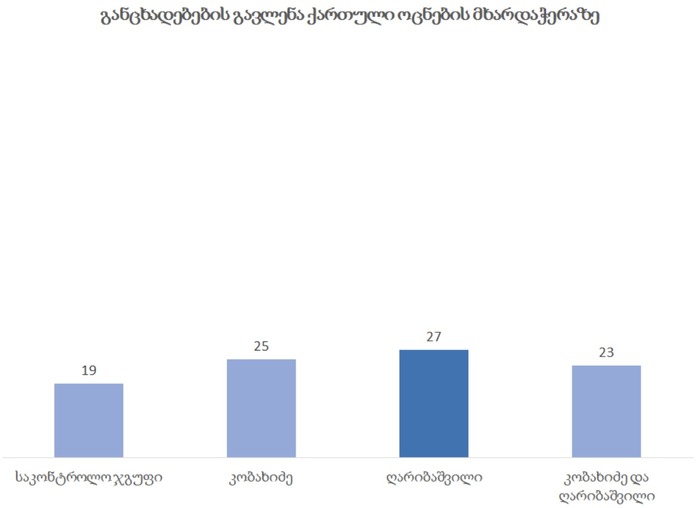ერთი კვლევის თანახმად, პაემანზე უფრო მოეწონებით თუ თან ნაკლებად მომხიბლავ მეგობარს გაიყოლებთ. ანალოგიურად, ხშირად ამომრჩევლის თვალში პარტიაც უფრო კარგად წარმოჩინდება, როდესაც მსგავს, თუმცა, ნაკლებად მიმზიდველ ოპონენტთან პაექრობს.
ეს ბლოგი აჩვენებს თუ როგორ მოქმედებს მსგავსი პრინციპი საქართველოში და როგორ შეუძლია “ქართულ ოცნებას” მხარდაჭერის გაზრდა თავის ფსევდო მეტოქე ხალხის ძალასთან კამათით.
2022 წლის ზაფხულში ქართულ ოცნებას გამოეყო პარლამენტის სამი წევრი, რათა უფრო “თავისუფლად ელაპარაკათ”. სინამდვილეში ეს ნიშნავდა დასავლეთის კრიტიკას, პირადად აშშ-ის ელჩის კრიტიკას და განცხადებებს, თითქოს დასავლეთი საქართველოს რუსეთ-უკრაინის ომში ითრევდა.
მოგვიანებით პარლამენტის სამ წევრს სხვებიც შეუერთდნენ და მოძრაობა ხალხის ძალა დააარსეს. თუმცა, მოძრაობის წევრი დეპუტატები საპარლამენტო უმრავლესობაში დარჩნენ. ამან კითხვა გააჩინა: ხალხის ძალა ნამდვილად უპირისპირდებოდა ქართულ ოცნებას თუ უბრალოდ, მისი სატელიტი პარტია იყო ანტიდასავლურად განწყობილი ამომრჩევლის მისამხრობად?
ხალხის ძალის განცხადებებზე მმართველი პარტიის ლიდერების ბუნდოვანმა რეაქციებმა ეს კითხვა კიდევ უფრო გააღრმავა. მაშინ, როცა პარტიის თავმჯდომარე ირაკლი კობახიძემ ხალხის ძალის ანტიდასავლური განცხადებები მეტწილად მოიწონა, პრემიერმა ღარიბაშვილმა მათ მოუწოდა, რადიკალური განცხადებებით არ დაეზიანებინათ ურთიერთობები აშშ-თან.
ასევე მრავლისმთქმელი იყო მხარდაჭერა, რომელიც ქართული ოცნების ლიდერებმა გამოუცხადეს ხალხის ძალის მიერ ინიციირებულ კანონპროექტს უცხოური გავლენის აგენტების შესახებ.
შეიძლება თუ არა, ქართულმა ოცნებამ თავისი რადიკალი განაყოფისგან რაიმე სარგებელი მიიღოს? ამის გასაგებად CRRC-საქართველომ 2022 წლის ნოემბერში საზოგადოებრივი აზრის გამოკითხვის ფარგლებში ექსპერიმენტი ჩაატარა. გამოკითხვისათვის შერჩეული 1 219 რესპონდენტი შემთხვევითი წესით ოთხ ჯგუფში გავანაწილეთ.
პირველ (საკონტროლო) ჯგუფში რესპონდენტებს ვაცნობეთ, რომ ხალხის ძალამ აშშ-ის ელჩი გააკრიტიკა და განაცხადა, რომ აშშ-ს საქართველოს რუსეთ-უკრაინის ომში ჩათრევა უნდოდა.
მეორე ჯგუფში რესპონდენტებს ხალხის ძალის განცხადება გავაცანით, თუმცა, დამატებით ირაკლი კობახიძის კომენტარის შესახებაც ვაცნობეთ, რომელმაც არ უარყო ხალხის ძალის განცხადებები.
მესამე ჯგუფში შემავალ რესპონდენტებს ხალხის ძალის განცხადება გავაცანით, თუმცა, დამატებით ვუთხარით ირაკლი ღარიბაშვილის კომენტარის შესახებაც, რომ მსგავსი განცხადებები აშშ-თან საქართველოს ურთიერთობებს ასუსტებდა.
მეოთხე ჯგუფში რესპონდენტებმა ხალხის ძალის განცხადებასთან ერთად კობახიძის მხარდამჭერი კომენტარიც მოისმინეს და ღარიბაშვილის კრიტიკული შენიშვნაც.
დასასრულს, ოთხივე ჯგუფში რესპონდენტებს ვკითხეთ, ხვალ რომ არჩევნები
ჩატარებულიყო, ქართულ ოცნებას მისცემდნენ ხმას, ხალხის ძალას თუ რომელიმე სხვა პარტიას.
მონაცემთა ანალიზი გვაჩვენებს, რომ ქართული ოცნებისათვის ყველაზე მომგებიანი გამოდგა განცხადება, რომელმაც ის თავისი ფსევდო ოპონენტისაგან ყველაზე მეტად განასხვავა. კერძოდ, პრემიერ ღარიბაშვილის კრიტიკულმა შენიშვნამ, რომელიც ხალხის ძალის ანტიამერიკულ განცხადებას არ დაეთანხმა, მმართველი პარტიის მხარდაჭერა 8 პროცენტული პუნქტით გაზარდა: მხოლოდ ხალხის ძალის ანტიამერიკული განცხადების მოსმენის შემდეგ ოცნებას მხარს ამომრჩევლების 19 პროცენტი დაუჭერდა, მაგრამ როცა რესპონდენტებმა ოცნების ლიდერისაგან ამ განცხადების კრიტიკაც მოისმინეს, მხარდაჭერა 27 პროცენტამდე გაიზარდა.
ფოტო: CRRC Georgia
აღსანიშნავია,რომ სტატისტიკურად მნიშვნელოვანი გავლენა მხოლოდ ღარიბაშვილის მიერ ხალხის ძალის განცხადების კრიტიკას ჰქონდა. კობახიძის კომენტარს ოცნების მხარდაჭერაზე გავლენა არ ჰქონია, ისევე, როგორც კობახიძის მხარდამჭერი და ღარიბაშვილის კრიტიკული კომენტარების ერთად მოსმენას.
ეს მიგნებები სხვა კვლევების შედეგებთანაც თანხვედრაშია; მათი მიხედვით, როგორც დემოკრატიულ, ისე ნაკლებად დემოკრატიულ ქვეყნებში რადიკალურ პარტიებს ხშირად უფრო მეტი სარგებელი მმართველი პარტიისთვის მოაქვთ, ვიდრე საკუთარი პარტიისთვის.
ჩვენი კვლევის თანახმად, ხალხის ძალას ამომრჩევლის მხოლოდ 3 პროცენტი დაუჭერდა მხარს. ხოლო მმართველი პარტიის მხარდაჭერა მთელი 8 პროცენტული პუნქტით გაიზარდა, როცა მათმა ლიდერმა სტრატეგიული პარტნიორის მიმართ ნაკლებად რადიკალური პოზიცია დაიჭირა.
აღსანიშნავია, რომ ამ ექსპერიმენტში გამოვიყენეთ განცხადებები ქვეყნის დასავლური ორიენტაციის შესახებ, რაც მეტწილად ეროვნული კონსენსუსის საგანია: მოსახლეობის დიდი უმრავლესობა მხარს უჭერს საქართველოს ნატოსა და ევროკავშირში გაწევრიანებას. გასარკვევია, გაზრდის თუ არა მმართველი პარტიის მხარდაჭერას ხალხის ძალასთან ისეთ საკითხზე დისკუსია, რომელზეც საზოგადოებაში ნაკლები თანხმობაა.
ამის პირველი მნიშვნელოვანი ტესტი შესაძლოა, ყოფილიყო ხალხის ძალის საკანონმდებლო ინიციატივა უცხოური გავლენის აგენტების შესახებ, თუმცა მმართველმა პარტიამ თავიდანვე ამ ინიციატივის მხარდაჭერა აირჩია. მომავალში გამოჩნდება მოინდომებს თუ არა ქართული ოცნება თავის რადიკალ განაყოფთან შედარებით პოზიციის უფრო ზომიერად წარმოჩენას.
შენიშვნა: სტატიაში წარმოდგენილი შეხედულებები ეკუთვნის ავტორს და არ წარმოადგენს On.ge-ის პოზიციას. მასალა ქვეყნდება OC Media-სთან პარტნიორობის ფარგლებში, რომლის შედეგად, გამოცემის სტატიები ამიერიდან ოთხ ენაზე გავრცელდება. საქართველოში OC Media-ს პარტნიორი On.ge-ა. სტატია ინგლისურად შეგიძლიათ წაიკითხოთ აქ. ეს სტატია დაწერა CRRC საქართველოს პრეზიდენტმა კობა თურმანიძემ. სტატიაში წარმოდგენილი შეხედულებები არის მხოლოდ ავტორის შეხედულებები და არ წარმოადგენს CRRC საქართველოს ან მასთან დაკავშირებული რომელიმე სუბიექტის შეხედულებებს.













